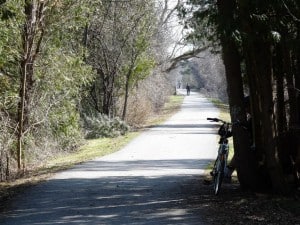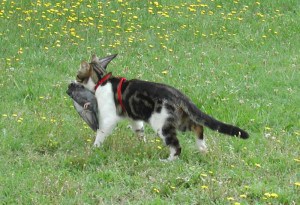Three contentious issues
This week, I’d like to provide news up-dates and personal thoughts on three contentious issues that should be of interest to anyone who cares about the natural world and, in the case of climate change, the future of this planet as we know it.
Parkway Opposition
It is time for all of us who care about greenspace and the protection of the natural environment in Peterborough to speak up on the Parkway issue. Opposition to the road and bridge is being led by the “Parks not Parkways” campaign, an initiative of the Peterborough Greenspace Coalition. The coalition unites the Friends of Jackson Park, Friends of Peterborough Trails, the Peterborough Field Naturalists and the No Parkway group. Now is the chance to be heard. The environmental assessment recommendation of a full Parkway with a four-lane bridge through Jackson Park goes to Council’s Committee of the Whole on November 13, with Council voting on the proposal November 20. Both are public meetings at the Evinrude Centre. I urge you to get involved by letting your Councillor know how you feel about this issue, requesting a lawn sign, signing the on-line petition, donating money or volunteering time. You should also consider coming and speaking at the meetings. For more information, go to parksnotparkways.ca
Among the many reasons to oppose the Parkway are the projected cost of 67 million dollars – almost $1,000 dollars for every citizen of Peterborough; the horrendous physical and aesthetic damage that would be done to Jackson Park by the construction of a four-lane bridge; the loss of greenspace along the Parkway where children can safely play and take part in outdoor education activities – there are no less than five schools located near the route; the fact that the proposed Parkway links only 20% of the City’s planned north end residences to only one of the two main employment areas in Peterborough; the loss of one of the City’s largest and most significant greenspace corridors where plants and animals are easily observed and people can connect with nature; and, finally, the fact that in the 2003 referendum, voters already said NO to the Parkway. Remember, too, that construction of the Parkway will only save a projected one to three minutes of driving time.
For many of us, there are more visceral arguments, as well. We simply don’t want to have to look at more pavement and concrete (e.g., Medical Drive between Weller and Parkhill); we don’t want to be assaulted by the noise and smell of traffic; and we don’t want to be assailed by the heat of the sun where once there was shade. In other words, we don’t want to give up anymore of Peterborough’s precious, health-giving greenspace to automobiles – even if we don’t use the greenspace ourselves.
It is also important to see the Parkway in relation to the debate on climate change and the absolute imperative of decreasing our consumption of fossil fuels and finding less damaging ways to help people travel through the City. My fear, however, is that there may not be enough people in Peterborough who know about this issue, are paying attention and who care. As our urbanized society becomes increasingly disconnected from nature, fewer and fewer of us have a strong sense of all that stands to be lost through projects such as these. In the end, we will only fight to protect what we know and love, and, sadly, a dwindling number of people know the natural world.
Climate change
According to the latest International Panel on Climate Change (IPCC) report released in September, warming of the climate system is unequivocal. Scientists are 95% certain that humans are the dominant cause of the warming. The report states that each of the last three decades has been successively warmer at the Earth’s surface than any preceding decade since 1850. In the Northern Hemisphere, 1983–2012 was likely the warmest 30-year period of the last 1400 years. The atmospheric concentrations of carbon dioxide, methane, and nitrous oxide have increased to levels unprecedented in at least the last 800,000 years. In other words, human influence on the climate system is clear. This is evident from the increasing greenhouse gas concentrations in the atmosphere and observed warming. Continued emissions of greenhouse gases will cause further warming and changes in all components of the climate system. The report concludes by saying that limiting climate change will require substantial and sustained reductions of greenhouse gas emissions.
Unfortunately, scientific facts such as these are not enough to stop climate changer deniers, one of whom is a regular contributor to the Letters to the Editor section of this paper. As a result of the Internet, you can now find all manner of fringe opinion and cherry-picked research findings to defend denialist beliefs such as his. However, to accept the arguments denying the cause, extent and/or danger of climate change, you would have to believe that thousands of scientists across the world are either incompetent or are willfully participating in a giant conspiracy to pull the wool over the eyes of the public in an effort to continue to get research grants. If you don’t believe scientists on climate change, why should you believe them on the dangers of smoking, on how to build a passenger jet or on any other area of scientific investigation? If scientists are as corrupt and/or unskilled as denialists imply, we would have to wonder if any scientific “facts” are trustworthy. That would mean our hospitals, economies, and technologies could not be trusted. Clearly, this is not the case. Furthermore, if trickery or ineptness were rampant, young and ambitious scientists would have exposed the charade or incompetence by now and become famous and highly-respected by doing so. You can rest assured that every argument that deniers have advanced has already been fully examined – and disproven – by researchers.
As lay people, we really have no choice but to base our beliefs and decision-making on what the best peer-reviewed, consensus-based science is telling us – not on right wing ideology, religious fundamentalism or anything else. The stakes are simply too high. And, so far, a massive, world-wide consensus clearly demonstrates that climate change is mostly man-made and a reality. As author Philip Dick said, “Reality is that which, when you stop believing in it, doesn’t go away.” In the meantime, climate change deniers gravely threaten us all by hampering efforts to reduce greenhouse gas emissions.
Free-roaming cats
Over the past four years, Environment Canada scientists conducted extensive analyses to produce the first-ever estimates of annual direct bird mortality from human-related sources. Their findings were published earlier this month in Avian Conservation and Ecology, the electronic scientific journal of Bird Studies Canada and the Society of Canadian Ornithologists. The results indicate that human-related activities destroy roughly 269 million birds and 2 million bird nests in Canada each year.
Most human-related bird deaths (about 99%) are caused by feral and pet cats and collisions with transmission lines, buildings, and vehicles. Cats appear to kill as many birds as all other sources combined – more than 100 million birds annually in Canada. Species that nest or feed on or near the ground are especially vulnerable to cat predation. Collisions with electricity transmission and distribution lines have been identified as the second-largest human-caused source of bird mortality in Canada, causing between 10-41 million bird deaths per year. Collisions with residential and commercial buildings are the third-highest of the human-related causes, killing an estimated 16-42 million birds each year – mostly at houses.
There is some hope on the horizon, however, at least at the local level. For over a year now, Councilor Henry Clarke has been working on a new Peterborough cat by-law with a group of vets, the Peterborough Humane Society, City staff and citizen volunteers. The by-law will address owned cats running at large (i.e., pets) and attempts to deal with the feral cat problem (i.e., wild cats). According to Clarke, City staff is still working on the legal aspects of the by-law, but he is hopeful it will be brought to Council in the near future. It is more important than ever that cat owners – like me – keep our pet cats under our constant care and supervision and not allow them to wander outside at will. Not only is it disrespectful of neighbours but allowing cats to roam freely is taking a huge toll on our increasingly fragile natural world. Unlike so many other threats to nature, it is also a problem we can do something about.

